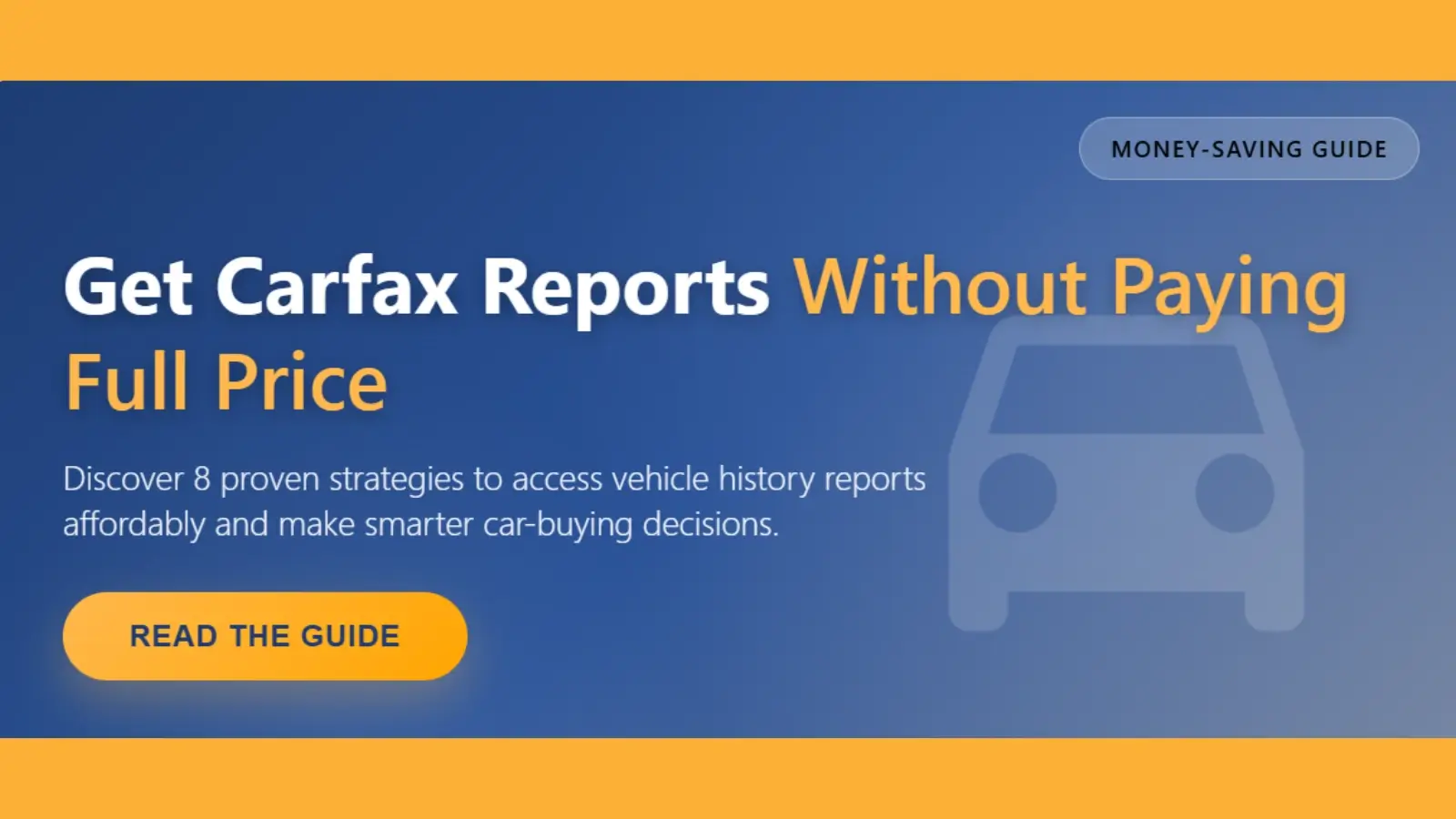


When you're in the market for a used car, a Carfax report is invaluable. It reveals critical information about a vehicle's history, including past accidents, title issues, service records, and potential flood damage. However, the full price of a single Carfax report can add up quickly, especially if you're comparing multiple vehicles. The good news? There are legitimate ways to access this essential information without breaking the bank. Let's explore practical strategies to get a Carfax report affordably.
Before diving into cost-saving methods, it's important to understand why a Carfax report is worth considering. These reports compile data from thousands of sources, including insurance companies, police records, and service facilities. Understanding a vehicle's past helps you make informed purchasing decisions and avoid buying a lemon. Whether you're concerned about previous accidents or want to verify a seller's claims, a Carfax report provides transparency that can save you thousands of dollars in the long run.
One of the simplest ways to reduce the per-report cost is to buy reports in bulk. Carfax offers discounts when you purchase multiple reports together. If you're actively shopping for a vehicle and plan to check several cars, buying a package deal can lower your average cost per report significantly. This approach is ideal if you're seriously hunting for your next vehicle and want to compare multiple options systematically.
Many dealerships provide Carfax reports to potential buyers at no charge. This is a standard practice among reputable dealers who want to demonstrate transparency. When you visit a dealership, simply ask if they can provide a Carfax report for any vehicle you're interested in. Not only does this save you money, but it also gives you confidence that the dealer is willing to back up their vehicles with documentation. This is particularly useful when you're comparing vehicles from different dealers.
While Carfax is the most well-known, other vehicle history services offer similar information at lower price points. Services like AutoCheck, VinAudit, and other independent providers compile vehicle history data and often charge less than Carfax. These alternatives may not have the exact same database, but they provide valuable insights into a car's history. Many used car buyers find that a combination of these services gives them comprehensive information without the premium cost.
Popular car buying platforms like AutoTrader, Cars.com, and Edmunds often include vehicle history reports with listings. Some of these reports may be abbreviated versions, but they can provide useful information without requiring a separate purchase. Additionally, many private sellers use these platforms and may have already included reports with their listings. Before purchasing a report independently, check if the seller or platform has already provided one.
If you're buying from a private seller, don't hesitate to ask them to provide a Carfax report. Many private sellers are willing to cover the cost of a report to facilitate a sale and demonstrate they're confident about their vehicle's history. This negotiation approach works especially well when you're seriously interested in a particular vehicle. A seller's willingness to provide documentation is often a good sign of their transparency.
Carfax and competing services frequently run promotional campaigns, especially during peak car-buying seasons. Sign up for email newsletters or follow their social media channels to stay informed about discounts and special offers. These promotions might include discounted single reports or bundled packages at reduced rates. Timing your report purchases during these promotional periods can result in substantial savings.
Some automotive clubs and memberships include Carfax reports as a benefit. If you're a member of AAA or similar organizations, you may have access to discounted or free vehicle history reports. It's worth checking with any memberships you currently hold to see if this benefit is available. Over time, the savings can add up, especially if you're a frequent car buyer.
Sometimes, you might not need a full Carfax report. Free or low-cost services like the National Insurance Crime Bureau (NICB) VINCheck can identify if a vehicle has been reported as stolen or salvaged. The Vehicle Identification Number (VIN) itself can be decoded to reveal information about the car's manufacturing details. By understanding what specific information you're seeking, you can sometimes find targeted, cheaper solutions rather than buying a comprehensive report.
One critical aspect of vehicle history reports is identifying functional damage. Cars that have experienced significant damage—whether from accidents, flooding, or other incidents—may have underlying issues that affect performance and safety. This is why understanding reports that detail functional damage is essential. If you want to learn more about how to interpret these critical sections of a vehicle history report, resources like cheap carfax offer guidance on understanding these reports better. You can also check their detailed breakdown of how functional damage appears in vehicle reports to gain deeper insights into what these designations really mean for your potential purchase.
Once you've obtained a vehicle history report—whether through one of these cost-saving methods or by paying full price—take time to review it thoroughly. Look for red flags like multiple accidents, title issues, flood damage, or inconsistent service records. Don't let a low purchase price on the vehicle itself distract you from potential problems revealed in the history report.
Getting a Carfax report without paying full price is entirely possible with the right approach. Whether you opt for bulk purchases, leverage dealership resources, explore alternative services, or take advantage of promotional offers, you have multiple pathways to access critical vehicle history information affordably. Remember, spending a little on a comprehensive vehicle history check now can prevent you from spending significantly more on repairs and headaches later. By combining these strategies and staying informed about special offers, you can make smart, data-driven purchasing decisions while keeping your budget in check.
Your next vehicle purchase deserves due diligence—and it doesn't have to cost a fortune.